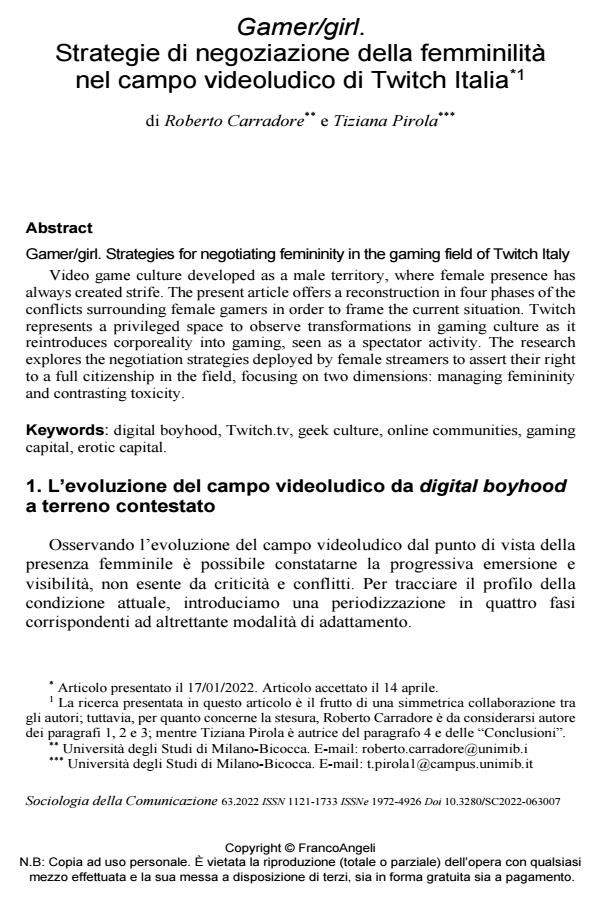Gamer/girl. Strategie di negoziazione della femminilità nel campo videoludico di Twitch Italia
Titolo Rivista SOCIOLOGIA DELLA COMUNICAZIONE
Autori/Curatori Roberto Carradore, Tiziana Pirola
Anno di pubblicazione 2022 Fascicolo 2022/63
Lingua Italiano Numero pagine 20 P. 111-130 Dimensione file 427 KB
DOI 10.3280/SC2022-063007
Il DOI è il codice a barre della proprietà intellettuale: per saperne di più
clicca qui
Qui sotto puoi vedere in anteprima la prima pagina di questo articolo.
Se questo articolo ti interessa, lo puoi acquistare (e scaricare in formato pdf) seguendo le facili indicazioni per acquistare il download credit. Acquista Download Credits per scaricare questo Articolo in formato PDF

FrancoAngeli è membro della Publishers International Linking Association, Inc (PILA), associazione indipendente e non profit per facilitare (attraverso i servizi tecnologici implementati da CrossRef.org) l’accesso degli studiosi ai contenuti digitali nelle pubblicazioni professionali e scientifiche.
Gamer/girl. Strategies for negotiating femininity in the gaming field of Twitch Italy Video game culture developed as a male territory, where female presence has always created strife. The present article offers a reconstruction in four phases of the conflicts surrounding female gamers in order to frame the current situation. Twitch represents a privileged space to observe transformations in gaming culture as it reintroduces corporeality into gaming, seen as a spectator activity. The research explores the negotiation strategies deployed by female streamers to assert their right to a full citizenship in the field, focusing on two dimensions: managing femininity and contrasting toxicity.
Parole chiave:digital boyhood, Twitch.tv, geek culture, online communities, gaming capital, erotic capital.
- Streaming out of the spiral of silence. Women’s visibility in gaming community and on twitch Roberto Carradore, Tiziana Pirola, in Internet Histories /2025 pp.107
DOI: 10.1080/24701475.2024.2431800
Roberto Carradore, Tiziana Pirola, Gamer/girl. Strategie di negoziazione della femminilità nel campo videoludico di Twitch Italia in "SOCIOLOGIA DELLA COMUNICAZIONE " 63/2022, pp 111-130, DOI: 10.3280/SC2022-063007